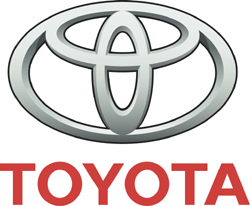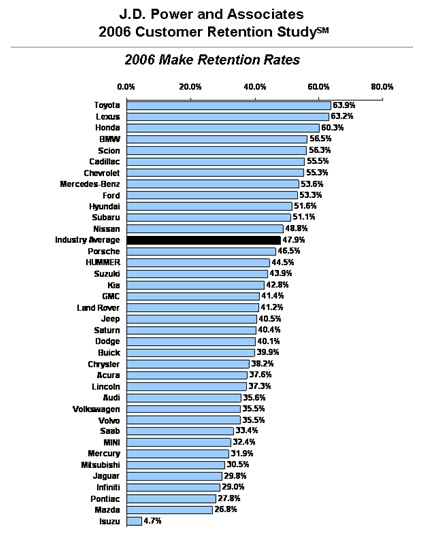 J.D. Power and Associates released its 2006 Customer Retention Study today, and to no one's surprise Toyota tops the list. The Japanese automaker averages a 63.9 percent customer retention rate, which means that of people who purchase a Toyota vehicle, about 64 percent purchase another one as their next vehicle. Toyota actually beat out its own brethren this year, narrowly replacing Lexus (63.2%) at the top of the list. This news isn't surprising, merely because Toyota's image of quality and customer service has been gaining momentum along with its sales. It is just an image, though, as the reality of Toyota's quality and customer service at the moment is arguably much different than its rosy reputation suggests. Nevertheless, Toyota has somehow managed to sear a positive image of itself on the collective consciousness of consumers, which we believe artificially boosts its performance a bit in the marketplace, as well as in studies like this one.
J.D. Power and Associates released its 2006 Customer Retention Study today, and to no one's surprise Toyota tops the list. The Japanese automaker averages a 63.9 percent customer retention rate, which means that of people who purchase a Toyota vehicle, about 64 percent purchase another one as their next vehicle. Toyota actually beat out its own brethren this year, narrowly replacing Lexus (63.2%) at the top of the list. This news isn't surprising, merely because Toyota's image of quality and customer service has been gaining momentum along with its sales. It is just an image, though, as the reality of Toyota's quality and customer service at the moment is arguably much different than its rosy reputation suggests. Nevertheless, Toyota has somehow managed to sear a positive image of itself on the collective consciousness of consumers, which we believe artificially boosts its performance a bit in the marketplace, as well as in studies like this one.
Overall J.D. Power and Associates reports that customer retention is declining across the auto industry, having fallen from 49.6 percent in 2003 to 47.9 percent this year. This makes perfect sense when you consider that the market for great vehicles has never been more competitive and new model classes, like the CUV, are pulling customers away from their trusted brands to try out new offerings.
You can follow the jump for a look at J.D. Power's press release and see a graph that shows see how each brand ranked.
[Source: J.D. Power]
PRESS RELEASE:
J.D. Power and Associates Reports:
Toyota Ranks Highest in Retaining New-Vehicle Buyers
Resale Value and Dealership Service Cited as Key Contributors to Retention
WESTLAKE VILLAGE, Calif.: 6 December 2006 - Toyota leads the automotive industry in retaining the highest percentage of new-vehicle purchasers, according to the J.D. Power and Associates 2006 Customer Retention StudySM released today.
Now in its fourth year, the study measures the percentage of new-vehicle buyers and lessees who replace a previously purchased new vehicle with another from the same nameplate. As a whole, the industry registers a slight decline in customer retention, falling to 47.9 percent, from 49.6 percent in 2005.
The study finds that of more than one-half of the brands included in the rankings have shown some decline in retention rates since the study's inception in 2003.
"Declining customer loyalty results from considerable improvements in quality combined with a plethora of choices for consumers," said Neal Oddes, director of product research and analysis at J.D. Power and Associates. "In some instances, new models, such as those in the rapidly growing crossover segment, can have a significant impact on customer retention for a brand."
With a 1.3 percentage-point improvement from 2005, Toyota (63.9%) replaces Lexus (63.2%) in the customer retention rankings. Toyota benefits from its reputation for exceeding customer expectations in terms of both short-term and long-term quality, which has helped to maintain the high resale value of its vehicles, as well as to expand its customer base. Honda retains its third-place ranking at 60.3 percent.
BMW, improving nearly 7 percentage points from last year, jumps six places to rank fourth at 56.5 percent. This gain, according to the study, can be mostly attributed to improved customer service stemming from BMW's introduction of a free vehicle maintenance policy for new purchasers.
Bolstered by a 15 percentage-point increase from 2005, Suzuki achieves the largest gain in customer retention among all brands with a 23 percentage-point overall gain since the study's inception in 2003. Several factors contribute to Suzuki's improving loyalty rates, including improved short- and long-term quality, as well as the introduction of new models with better customer appeal. Suzuki customers are also often offered attractive purchase incentives.
Also registering robust three-year gains are Nissan, advancing 8.2 percentage points from 2003, and Lexus, which gains 7.7 percentage points.
"During the past four years, Nissan has had a remarkable turnaround in image and financial performance, due in part to stepped-up quality initiatives and improved resale values," Oddes said. "The benefit of this is that the brand is retaining more of its customers than it did in 2003, which is helping turn around its financial performance."
Also worth noting is Cadillac, which, through quality improvements and a breadth of products, has achieved an increase in customer retention rates each year since 2003.
The 2006 Customer Retention Study is based on responses from 138,630 new-vehicle buyers and lessees, of which 82,274 replaced a vehicle that was previously acquired new.



Sign in to post
Please sign in to leave a comment.
Continue